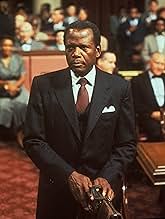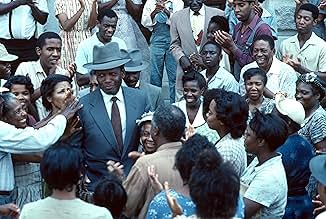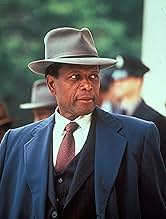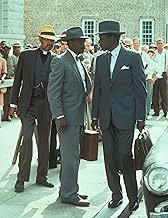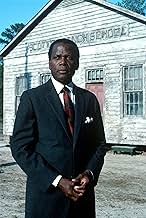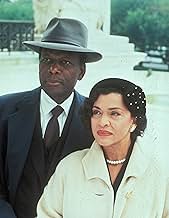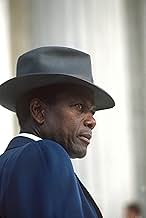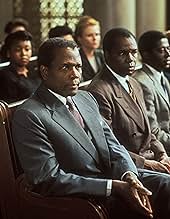AVALIAÇÃO DA IMDb
7,5/10
881
SUA AVALIAÇÃO
Adicionar um enredo no seu idiomaA dramatization of the American court case that destroyed the legal validity of racial segregation.A dramatization of the American court case that destroyed the legal validity of racial segregation.A dramatization of the American court case that destroyed the legal validity of racial segregation.
- Ganhou 2 Primetime Emmys
- 3 vitórias e 12 indicações no total
Explorar episódios
Enredo
Você sabia?
- CuriosidadesThis was Burt Lancaster's final performance. On November 30, 1990, shortly after filming ended, he suffered a massive stroke and remained incapacitated for the final four years of his life.
- Erros de gravaçãoThe entire movie is set in the 1950s, but in at least one of the New York City street scenes, both the pedestrians' clothing and the cars on the street appear to date from the late 1960s to the 1970s.
- ConexõesFeatured in The 43rd Annual Primetime Emmy Awards (1991)
Avaliação em destaque
The relatively peaceful correction through the legal process of an age old wrong is the United States of America at its very best. That is in fact what occurred in the landmark Brown vs. Board of Education decision in 1954.
Looking back at that case 52 years later the most significant result of that decision was not in our domestic affairs, but in foreign policy. We were engaged in a Cold War at the time where we vying for the moral leadership of the world against the Soviet Union. If we had not put our own house in order, we would never have gotten any kind of support from any third world nations and never would have triumphed in the Cold War.
And it was all for want of a school bus. Black kids in rural Clarendon County, South Carolina had to walk miles to their designated school because the whites running the board of education of that county wouldn't give them a bus. That was the start of the lawsuit that eventually found it's way to the United States Supreme Court.
I suppose it is fitting that one black icon be playing the part of another in this film. Sidney Poitier is very good as Thurgood Marshall, the attorney for the National Association for the Advancement of Colored People who believed in the case and fought for it. And like the ending of a fairy tale, Thurgood Marshall was appointed to the Supreme Court where he won the case. But that's later on in his life.
Burt Lancaster's farewell performance is of John W. Davis, called the lawyer's lawyer by a host of his colleagues and in fact that is the title of a biography about him. From 1911 to 1921 he was in succession, a Congressman from West Virginia, Solicitor General of the United States and our Ambassador to Great Britain. He left public life after that except in 1924 he was chosen after 103 ballots as a compromise Democratic presidential candidate, but lost to Calvin Coolidge.
Oddly enough though it was after becoming a losing presidential candidate that Davis gained his greatest reputation as one of our country's leading attorneys. He worked for big corporations and earned some mighty big fees, but he also did a lot of pro bono work as well. Sad, but his association with racial segregation forever tarnished his reputation. Lancaster plays him with restraint and dignity and Burt was just around the age Davis would have been in arguing before the Supreme Court.
The third lead in this is Richard Kiley as Chief Justice Earl Warren. Warren, a liberal Republican Governor of California, was appointed to the bench by Dwight Eisenhower while the Court was considering the case. In fact Ike made another appointment of John Marshall Harlan in place of Robert H. Jackson and those two appointments probably won the case for the NAACP.
Kiley comes across as the Earl Warren we remember as Chief Justice, a man who brought common sense to his judicial philosophy. Considered probably one of the three greatest whoever held the job as Chief Justice, the USA is still feeling the political and social impact of the many decisions he led the court in rendering.
Warren's problem was that he desperately wanted a unanimous court in this landmark decision. Yet there were a few of the Justices for reasons of precedent and their own personal backgrounds who did not want to take this momentous step.
The key scene for Kiley is when on a trip with his black chauffeur after a night in a hotel, Kiley goes out and finds the man has slept in his car because he can't find a hotel that will accommodate blacks. It was a defining moment for Earl Warren in real life and Kiley in the film. He knew he was being given a great chance to right a great wrong and stop something evil. The moral impact of segregation was felt by Kiley and by the audience as well.
Separate But Equal is a great historical drama which humanizes the players in an American success story.
Looking back at that case 52 years later the most significant result of that decision was not in our domestic affairs, but in foreign policy. We were engaged in a Cold War at the time where we vying for the moral leadership of the world against the Soviet Union. If we had not put our own house in order, we would never have gotten any kind of support from any third world nations and never would have triumphed in the Cold War.
And it was all for want of a school bus. Black kids in rural Clarendon County, South Carolina had to walk miles to their designated school because the whites running the board of education of that county wouldn't give them a bus. That was the start of the lawsuit that eventually found it's way to the United States Supreme Court.
I suppose it is fitting that one black icon be playing the part of another in this film. Sidney Poitier is very good as Thurgood Marshall, the attorney for the National Association for the Advancement of Colored People who believed in the case and fought for it. And like the ending of a fairy tale, Thurgood Marshall was appointed to the Supreme Court where he won the case. But that's later on in his life.
Burt Lancaster's farewell performance is of John W. Davis, called the lawyer's lawyer by a host of his colleagues and in fact that is the title of a biography about him. From 1911 to 1921 he was in succession, a Congressman from West Virginia, Solicitor General of the United States and our Ambassador to Great Britain. He left public life after that except in 1924 he was chosen after 103 ballots as a compromise Democratic presidential candidate, but lost to Calvin Coolidge.
Oddly enough though it was after becoming a losing presidential candidate that Davis gained his greatest reputation as one of our country's leading attorneys. He worked for big corporations and earned some mighty big fees, but he also did a lot of pro bono work as well. Sad, but his association with racial segregation forever tarnished his reputation. Lancaster plays him with restraint and dignity and Burt was just around the age Davis would have been in arguing before the Supreme Court.
The third lead in this is Richard Kiley as Chief Justice Earl Warren. Warren, a liberal Republican Governor of California, was appointed to the bench by Dwight Eisenhower while the Court was considering the case. In fact Ike made another appointment of John Marshall Harlan in place of Robert H. Jackson and those two appointments probably won the case for the NAACP.
Kiley comes across as the Earl Warren we remember as Chief Justice, a man who brought common sense to his judicial philosophy. Considered probably one of the three greatest whoever held the job as Chief Justice, the USA is still feeling the political and social impact of the many decisions he led the court in rendering.
Warren's problem was that he desperately wanted a unanimous court in this landmark decision. Yet there were a few of the Justices for reasons of precedent and their own personal backgrounds who did not want to take this momentous step.
The key scene for Kiley is when on a trip with his black chauffeur after a night in a hotel, Kiley goes out and finds the man has slept in his car because he can't find a hotel that will accommodate blacks. It was a defining moment for Earl Warren in real life and Kiley in the film. He knew he was being given a great chance to right a great wrong and stop something evil. The moral impact of segregation was felt by Kiley and by the audience as well.
Separate But Equal is a great historical drama which humanizes the players in an American success story.
- bkoganbing
- 17 de jan. de 2006
- Link permanente
Principais escolhas
Faça login para avaliar e ver a lista de recomendações personalizadas
- How many seasons does Separate But Equal have?Fornecido pela Alexa
Detalhes
- Data de lançamento
- País de origem
- Idioma
- Também conhecido como
- Separate But Equal
- Locações de filme
- Empresas de produção
- Consulte mais créditos da empresa na IMDbPro
Contribua para esta página
Sugerir uma alteração ou adicionar conteúdo ausente



